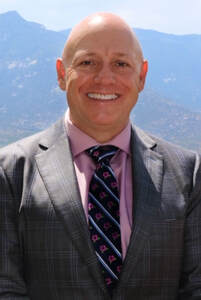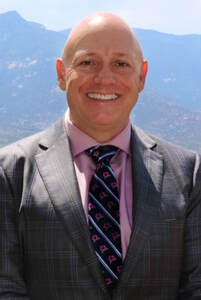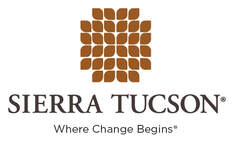CE Programs on Substance Abuse Issues and Treatment

Friday, April 3
Three sessions available
THESE PROGRAMS WILL NOT BE HELD AS SCHEDULED DUE TO CONCERNS ABOUT THE CORONAVIRUS - A NEW DATE WILL BE DETERMINED AND ANNOUNCED AS SOON AS KNOWN
The Women's Center is proud to co-sponsor, with Sierra Tucson, three programs presented by guest speaker Donnie G. Sansom, D.O., Associate Medical Director and Director of Addictions Programs at Sierra Tucson, a premier residential treatment center for drug and alcohol addiction and behavioral health.
These programs are intended for intermediate level practitioners in the fields of Psychology, Social Work, and Counseling.
Psychologists: These programs are co-sponsored by Sierra Tucson and the Women's Center for Healing & Transformation. Sierra Tucson is approved by the American Psychological Association to sponsor continuing education for psychologists.
Counselors: Continuing education hours will be approved by the Louisiana Counseling Association as authorized by the Louisiana Professional Counselor Licensing Board of Examiners. (Approvals pending)
Social Workers: The Women's Center for Healing & Transformation is an authorized approval organization for the Louisiana Board of Social Work Examiners.
Choose to attend one, two or all three sessions. Schedule for the day is as follows (scroll down to read detailed descriptions below):
Three sessions available
THESE PROGRAMS WILL NOT BE HELD AS SCHEDULED DUE TO CONCERNS ABOUT THE CORONAVIRUS - A NEW DATE WILL BE DETERMINED AND ANNOUNCED AS SOON AS KNOWN
The Women's Center is proud to co-sponsor, with Sierra Tucson, three programs presented by guest speaker Donnie G. Sansom, D.O., Associate Medical Director and Director of Addictions Programs at Sierra Tucson, a premier residential treatment center for drug and alcohol addiction and behavioral health.
These programs are intended for intermediate level practitioners in the fields of Psychology, Social Work, and Counseling.
Psychologists: These programs are co-sponsored by Sierra Tucson and the Women's Center for Healing & Transformation. Sierra Tucson is approved by the American Psychological Association to sponsor continuing education for psychologists.
Counselors: Continuing education hours will be approved by the Louisiana Counseling Association as authorized by the Louisiana Professional Counselor Licensing Board of Examiners. (Approvals pending)
Social Workers: The Women's Center for Healing & Transformation is an authorized approval organization for the Louisiana Board of Social Work Examiners.
Choose to attend one, two or all three sessions. Schedule for the day is as follows (scroll down to read detailed descriptions below):
SCHEDULE FOR FRIDAY, APRIL 3
THESE PROGRAMS WILL NOT BE HELD AS SCHEDULED DUE TO CONCERNS ABOUT THE CORONAVIRUS
A NEW DATE WILL BE DETERMINED AND ANNOUNCED AS SOON AS KNOWN
THESE PROGRAMS WILL NOT BE HELD AS SCHEDULED DUE TO CONCERNS ABOUT THE CORONAVIRUS
A NEW DATE WILL BE DETERMINED AND ANNOUNCED AS SOON AS KNOWN
9:30 - 11:30 am (Check-in at 9:00)
Red, White and Cannabis: Our Emerging National Cannabis Crisis
2.0 CE hours available - Cost: $50
11:30 am - 1:00 pm - Break for lunch*
* For those attending both the 9:30 session and the 1:00 session, lunch at Abita Cafe' is included at no cost, courtesy of Acadia Healthcare Treatment Placement Specialists. See menu
1:00 - 2:30 pm (Check-in at 12:30)
Trauma, Shame and Addiction: How Did We Get Here…and How Do We Change?
1.5 CE hours available - Cost: $40
3:00 - 4:30 pm (Check-in at 2:30)
The Opioid Crisis: Where Are We Now and What is New?
1.5 CE hours available - Cost: $40
Red, White and Cannabis: Our Emerging National Cannabis Crisis
2.0 CE hours available - Cost: $50
11:30 am - 1:00 pm - Break for lunch*
* For those attending both the 9:30 session and the 1:00 session, lunch at Abita Cafe' is included at no cost, courtesy of Acadia Healthcare Treatment Placement Specialists. See menu
1:00 - 2:30 pm (Check-in at 12:30)
Trauma, Shame and Addiction: How Did We Get Here…and How Do We Change?
1.5 CE hours available - Cost: $40
3:00 - 4:30 pm (Check-in at 2:30)
The Opioid Crisis: Where Are We Now and What is New?
1.5 CE hours available - Cost: $40
9:30 - 11:30 am (Check-in begins at 9:00)
Red, White and Cannabis: Our Emerging National Cannabis Crisis
Conundrums, Canards and Clinical Corroboration
2.0 CE hours for Social Workers, Counselors and Psychologists, Fee $50
This presentation will cover the impact of social engineering by the Cannabis Industry currently being utilized in America and how it influences both policy and substance use disorder. Using discussion points and questions garnered from real patients (non-disclosed), the speaker will lead the participants into better understanding of current realities of cannabis use and address them using clinical data, as opposed to marketing and opinion, in order to impact patient care and policy thought. Examples include: thorough examination of currently available forms of cannabis as compared to earlier products, including CBD preparations and very-high level THC products; the addictive potential of marijuana; cognitive impairment with adolescent habitual use; examining recent data surrounding cannabis related psychosis; the realities surrounding medicinal usage; and an examination of how habitual use in the emerging adult and adolescent population is placing those with substance use disorder at risk for mental illness.
Red, White and Cannabis: Our Emerging National Cannabis Crisis
Conundrums, Canards and Clinical Corroboration
2.0 CE hours for Social Workers, Counselors and Psychologists, Fee $50
This presentation will cover the impact of social engineering by the Cannabis Industry currently being utilized in America and how it influences both policy and substance use disorder. Using discussion points and questions garnered from real patients (non-disclosed), the speaker will lead the participants into better understanding of current realities of cannabis use and address them using clinical data, as opposed to marketing and opinion, in order to impact patient care and policy thought. Examples include: thorough examination of currently available forms of cannabis as compared to earlier products, including CBD preparations and very-high level THC products; the addictive potential of marijuana; cognitive impairment with adolescent habitual use; examining recent data surrounding cannabis related psychosis; the realities surrounding medicinal usage; and an examination of how habitual use in the emerging adult and adolescent population is placing those with substance use disorder at risk for mental illness.
After attending this workshop, participants will be able to:
- Identify the phenomenon of social engineering and further identify its effects upon public opinion of how cannabis is grown, distributed, legislated and consumed,
- Recognize how cannabis products and technology have significantly changed in America over the past several decades and discuss current trends in marijuana usage and caveats associated with this,
- Define and apply evidence-based clinical concepts in practice, which are currently challenged by the marijuana growers, lobbyists and consumers,
- Utilize this information to apply in policy discussions surrounding the realities of cannabis use in America including legalization and medicinal usage.
1:00 - 2:30 pm (Check-in begins at 12:30)
Trauma, Shame and Addiction: How Did We Get Here…and How Do We Change?
1.5 CE hours for Social Workers, Counselors and Psychologists, Fee: $40
As the opioid epidemic continues to unfold on the American landscape, our society is experiencing the loss of the flower of a generation. Studies reveals that alcohol use remains an even larger and growing public health problem than opioids. Marijuana use has become so casual as to usher itself into mainstream America - an innocuous choice for some perhaps, but for many others including the youngest among us, its effects are devastating. Addiction is now a public health concern of epic proportions.
What about the undercurrents to addiction, the things that frequently start addiction, that fuel addiction? What about the undertreated public health menace that directly impacts and precedes addiction, and negatively affects the health and longevity of individuals and families? This silent menace is trauma, especially trauma from childhood. Learn to recognize that untreated trauma leads to the failure of so many individuals who find themselves chronically relapsing into the spiral of opioid addiction, alcoholism, gambling and sex addiction.
Trauma, Shame and Addiction: How Did We Get Here…and How Do We Change?
1.5 CE hours for Social Workers, Counselors and Psychologists, Fee: $40
As the opioid epidemic continues to unfold on the American landscape, our society is experiencing the loss of the flower of a generation. Studies reveals that alcohol use remains an even larger and growing public health problem than opioids. Marijuana use has become so casual as to usher itself into mainstream America - an innocuous choice for some perhaps, but for many others including the youngest among us, its effects are devastating. Addiction is now a public health concern of epic proportions.
What about the undercurrents to addiction, the things that frequently start addiction, that fuel addiction? What about the undertreated public health menace that directly impacts and precedes addiction, and negatively affects the health and longevity of individuals and families? This silent menace is trauma, especially trauma from childhood. Learn to recognize that untreated trauma leads to the failure of so many individuals who find themselves chronically relapsing into the spiral of opioid addiction, alcoholism, gambling and sex addiction.
At the conclusion of this seminar, participants will be able to:
- Explain the impact of developmental trauma on addiction and treatment methods,
- Define the adverse childhood experience screening tool and explain how it may be implemented into therapeutic practice,
- Identify factors that contribute to substance use disorder, overdose, and suicidality.
3:00 - 4:30 pm (Check-in begins at 2:30)
The Opioid Crisis: Where Are We Now and What is New?
The Primer on Medically Assisted Treatment for Mental Health Professionals
1.5 CE hours for Social Workers, Counselors and Psychologists, Fee $40
Opioid use and death from opioid overdose remains epidemic in America according to the Centers for Disease Control and the Surgeon General’s Office. While it is now considered standard of care to offer Medically Assisted Treatment to combat active addiction and decrease risk of overdose death, the viewpoint that many mental health practitioners have towards Medically Assisted Treatment often remains jaded in some circles, often due to preconceptions about the efficacy of MAT, the definition of sobriety, and persistent negative perceptions. The purpose of this program is to offer an updated look at the current opioid epidemic, the neurobiology of addiction and how MAT with Buprenorphine specifically impacts this health crisis in a positive way in order to afford a balanced view to mental health professionals.
The Opioid Crisis: Where Are We Now and What is New?
The Primer on Medically Assisted Treatment for Mental Health Professionals
1.5 CE hours for Social Workers, Counselors and Psychologists, Fee $40
Opioid use and death from opioid overdose remains epidemic in America according to the Centers for Disease Control and the Surgeon General’s Office. While it is now considered standard of care to offer Medically Assisted Treatment to combat active addiction and decrease risk of overdose death, the viewpoint that many mental health practitioners have towards Medically Assisted Treatment often remains jaded in some circles, often due to preconceptions about the efficacy of MAT, the definition of sobriety, and persistent negative perceptions. The purpose of this program is to offer an updated look at the current opioid epidemic, the neurobiology of addiction and how MAT with Buprenorphine specifically impacts this health crisis in a positive way in order to afford a balanced view to mental health professionals.
As a result of attending this training, the participants will be able to:
- Identify the current state of the opioid crisis and how it is affecting public health and utilize tools to help combat this epidemic,
- Recognize the neurobiology of addictive disorders,
- Define and apply evidence-based clinical concepts in practice, including referral of patients for appropriate medically assisted treatment (MAT), including criteria for who is a candidate for MAT.
ABOUT THE PRESENTER
Donnie Sansom, DO
Associate Medical Director, Director of Addictions Programs
Donnie Sansom, DO
Associate Medical Director, Director of Addictions Programs

Donald Sansom, DO received his Bachelor of Science from Northern Arizona University in 1987, and his Doctor of Osteopathy degree from A.T. Still University (Kirksville Campus) in 1991. He completed an internship in internal medicine at the Jewish Hospital of Cincinnati and, subsequently, completed his residency in anesthesiology at the University of Cincinnati in 1995, spending his last year serving as elected Chief Resident. From 1995 through 2012, he practiced in a diverse and robust private practice setting with an emphasis in obstetrical and pediatric anesthesia at Tucson Medical Center. In addition to his busy clinical practice, Dr. Sansom served in a variety of administrative and clinical leadership positions at Tucson Medical Center, including serving as Anesthesia Department Chairman, and as a member of the medical executive committee. During that time, he volunteered for five years co-leading medical mission trips to Honduras to serve the medically indigent.
Upon retiring from anesthesia in 2012, Dr. Sansom became the medical director in a corrections facility and launched what would become the next chapter in his career as he began working with individuals with various forms of substance abuse and co-morbidities. In 2015, Dr. Sansom left the medical director position to pursue an opportunity to start a drug and alcohol treatment center in both a clinical and administrative role, further cementing his commitment to treating patients with addiction.
Dr. Sansom has a passion for working with individuals with all forms of substance use disorder and shepherding them along a path of lifelong sobriety and health. To that end, he is firmly committed to Sierra Tucson’s holistic multidisciplinary approach. He has interests in neuroscience as it relates to addiction, mindfulness, neuroplasticity, and spirituality. Dr. Sansom is intrigued by how science and spirituality intersect in medicine and in people’s lives and strongly believes in educating patients about addiction as a disease and about recovery.
Dr. Sansom is a Diplomate of the American Board of Anesthesiology, a member of the American Society of Addiction Medicine (ASAM), the American Osteopathic Academy of Addiction Medicine (AOAAM), and he holds certificates in AOAAM Essentials of Addiction Medicine and has completed the AOAAM advanced Addiction Medicine Course.
Upon retiring from anesthesia in 2012, Dr. Sansom became the medical director in a corrections facility and launched what would become the next chapter in his career as he began working with individuals with various forms of substance abuse and co-morbidities. In 2015, Dr. Sansom left the medical director position to pursue an opportunity to start a drug and alcohol treatment center in both a clinical and administrative role, further cementing his commitment to treating patients with addiction.
Dr. Sansom has a passion for working with individuals with all forms of substance use disorder and shepherding them along a path of lifelong sobriety and health. To that end, he is firmly committed to Sierra Tucson’s holistic multidisciplinary approach. He has interests in neuroscience as it relates to addiction, mindfulness, neuroplasticity, and spirituality. Dr. Sansom is intrigued by how science and spirituality intersect in medicine and in people’s lives and strongly believes in educating patients about addiction as a disease and about recovery.
Dr. Sansom is a Diplomate of the American Board of Anesthesiology, a member of the American Society of Addiction Medicine (ASAM), the American Osteopathic Academy of Addiction Medicine (AOAAM), and he holds certificates in AOAAM Essentials of Addiction Medicine and has completed the AOAAM advanced Addiction Medicine Course.
Online registration and pre-payment required for all attendees. This event is co-ed. Choose any one, two or all three sessions.
Registration costs for Friday, April 3 programs:
$50 (9:00 am) - Red, White and Cannabis: Our Emerging National Cannabis Crisis
$40 (1:00 pm) - Trauma, Shame and Addiction: How Did We Get Here…and How Do We Change?
$40 (3:00 pm) - The Opioid Crisis: Where Are We Now and What is New?
For those attending both the 9:30 a.m. and the 1:00 p.m. sessions, lunch is included at no cost.
Class sizes are limited. Register early to save your spot.
Cancellation Policy: No refunds after April 1.
THESE PROGRAMS WILL NOT BE HELD AS SCHEDULED DUE TO CONCERNS ABOUT THE CORONAVIRUS - A NEW DATE WILL BE DETERMINED AND ANNOUNCED AS SOON AS KNOWN
Registration costs for Friday, April 3 programs:
$50 (9:00 am) - Red, White and Cannabis: Our Emerging National Cannabis Crisis
$40 (1:00 pm) - Trauma, Shame and Addiction: How Did We Get Here…and How Do We Change?
$40 (3:00 pm) - The Opioid Crisis: Where Are We Now and What is New?
For those attending both the 9:30 a.m. and the 1:00 p.m. sessions, lunch is included at no cost.
Class sizes are limited. Register early to save your spot.
Cancellation Policy: No refunds after April 1.
THESE PROGRAMS WILL NOT BE HELD AS SCHEDULED DUE TO CONCERNS ABOUT THE CORONAVIRUS - A NEW DATE WILL BE DETERMINED AND ANNOUNCED AS SOON AS KNOWN
Questions? Contact the Women's Center at (985) 892-8111 or [email protected]
Workshop Location:
Women’s Center for Healing & Transformation
71667 Leveson Street
Abita Springs, LA 70420 map
Women’s Center for Healing & Transformation
71667 Leveson Street
Abita Springs, LA 70420 map




